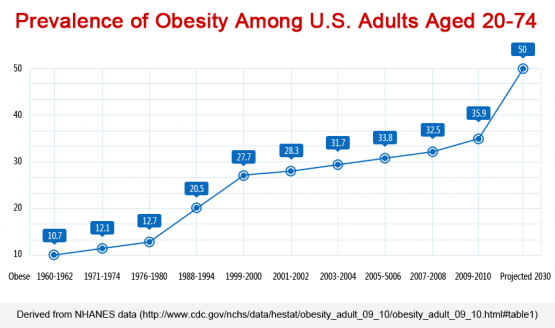Most Recent News


Popular News




There are far too many government policies that incentivize obesity. How can we stop it—Or, can we even hope to stop it?
Every year in America, obesity causes an unbelievable estimate of 400,000 deaths and $190 billion in healthcare costs. Yes, billions. That’s over 20% of our entire medical spending.
Now consider that this number is only for obesity, and not including general unhealthy levels of overweight as well. Otherwise, it’s likely the number would be much higher, considering how many medical problems are directly related to terrible eating and lack of exercise.
Even more staggering, obesity has (unsurprisingly?) been on the rise for decades.
People have not always been this heavy, so the idea that genetics plays a large role in obesity is simply counter-intuitive. The obesity rating in the 1920s was abysmal, and evolutionary genetics do not change that drastically over such few years. In short, a genetic deviation would not just appear all over the first world and suddenly make 40% of the population overweight.
Just look at this graph:

It’s other symptoms at play here. And our government policies contribute significantly.
(Consider also reading my other article on the Russian Transition and Obesity.)
The government and culture fails on an extraordinary level at teaching children and young adults the importance of nutrition and fitness.
 Basic classes on how to cook, which nutritional guidelines are truly important, and how to count calories are all fundamentally misunderstood by most of the population.
Basic classes on how to cook, which nutritional guidelines are truly important, and how to count calories are all fundamentally misunderstood by most of the population.
The truth is: calories in vs calories out is a great starting concept for losing weight. It doesn’t cover the important macro nutrients needed… But it will help anyone lose weight. It would help solve obesity.
This basic building block of nutrition has largely been ignored in favor of fad diets and other disingenuous weight-loss plans.
Most doctors honestly care about their patients. However, our current policies do not provide them with the tools to effectively treat obesity.
One study found that only a third of patient visits resulted in a discussion on a strategy to tackle obesity.
The financial incentives for doctors are just not there. Nor do they have the time to do it, with all the paperwork and related barriers that our policies put in the way of our physicians.

Obamacare and healthcare in the US are setup to generally allow everyone an affordable healthcare insurance.
They have fought long and hard for public policies such as not allowing to discriminate based on preexisting conditions and other important gatekeepers to insurance prices.
What has this caused?
Now, someone that weighs 400 lbs can get insurance at a price relative to someone that has stayed in excellent physical shape.
Is this fair?
No.
The individual who has worked hard, probably for decades, to remain healthy, has to subsidize the obese person’s McDonalds addiction.
Financial incentives, much like incentives in general, are there to slyly convince a participant to choose a beneficial path.
But there is no financial disincentive for obesity. It should cost an overweight person more for their health insurance. This is because it will generally cost more to insure them over their lifetime.
But without that price hike, there is no incentive for them to lose weight. If you had to pay $50 more a month, just because you’re overweight, it would provide a great mental jump to go to the gym and eat healthier.
We target smokers endlessly. Through advertising, banning them in public areas, and the proliferation of smoking-cessation products we have effectively slaughtered smoking rates in the US.
This is because smoking causes a horrific impact on the cost of healthcare.
But so does obesity.
So why aren’t we doing the same proactive assaults on obesity?
I believe it’s primarily because it ‘hurts people’s feelings’. But that shouldn’t matter; it’s an incredibly important epidemic to address. Especially as we are moving further to the left, and more socialized healthcare is seemingly becoming inevitable.
Policies should be targeted at obese individuals the same as they are for smokers. No exceptions. But instead, we promote over consumption through materialism and indulgence while also allowing obese people the freedom of receiving subsidized insurance prices. When we instead should campaign against them aggressively.
The culture in the US (enabled by the government) caters to the obese. Through the destruction of the family unit, to companies catering to the bottom line, all have drastic effects on how our culture directly correlates with obesity rates.
Check out the article “The Effects and Implications of The Culture of Obesity” for a deeper dive into this topic.
Obesity is, without a doubt, an epidemic.
We need to address these issues as quickly as possible. By turning a blind eye, we’re hurting the next generations and our own wallets.
The policies we implement are major reasons behind this rise of obesity. By focusing our attention on them, we may finally see some honest change over the coming years.
This is a clear symbol of the degeneration of a people—the physical representation of that degeneracy.
(Learn More About The Dominion Newsletter Here)